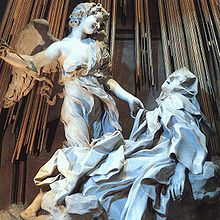"There is only one end for man, and that end is not to be found within himself. Man’s end, man’s purpose is God, something outside himself which is greater than himself. It would be false Christian spirituality to say that the end of man is his own perfection. That is not the end of man. Man’s perfection is not in himself, nor can it ever be in himself. Man’s perfection is in God, in incorporation in Christ, and, through Christ, in God. All your virtues and all your piety, so to speak, would remain unfinished and incomplete if you were not raised above yourself to God."One of the biggest, most important, but at the same time most obscure quarrels in modern theology rages around the correct interpretation of the "natural desire for God" – the idea that our hearts are restless till they rest in God (St Augustine). In fact St Thomas taught that all our desires, even for limited ends such as wealth or sexual pleasure or fame, can only be perfectly fulfilled in God and so imply a
desire for Him. But this means that by nature we desire a happiness, an end, that we can’t give ourselves by nature, because the Essence of God is infinitely beyond our natural grasp as finite creatures. The further problem is that, once he has created us this way, God seems obliged to offer us a way of reaching this impossible fulfilment.
As St Thomas puts it in SCG, III, ch. 25, "to understand God is the end [telos, goal] of every intellectual substance [mind]", for "all creatures, even those devoid of understanding, are ordered to God as to an ultimate end," and intellectual creatures like ourselves or the angels can only achieve it "through their proper operation of understanding", i.e. by understanding God – not merely that He is, but what He is (His substance or Essence). In chapters 51-53 of SCG he explains that because we have a "natural desire" to understand the divine substance, it must be possible for this desire to be fulfilled; that is, for God's Essence to be seen intellectually (just as the presence of thirst implies the existence of water). But this can only happen if the divine Essence becomes "both what is seen and that whereby it is seen", i.e. if the Essence is "joined as an intelligible form to the intellect" so that we can see God through God and not through anything less than Him (such as our own limited ideas). Only God can see God, so if we are to see Him it must be by participating in His knowledge of Himself. The created intellect is made able to receive this Essence as intelligible form by divine assistance in the guise of the "light of glory"promised in Psalm 35:10: "In thy light we shall see light."
But does this (some theologians worry) give us a "right" to grace and thus deprive God's gift of its freedom, since He is under an obligation to give it to us? Hardly, since it was his decision to create intellectual creatures that have this need. In any case the divine freedom is perfect, and so coincides with necessity. The highest freedom is not freedom of choice but self-possession; or, one might say, the complete "ownership" of every decision or act of will. Free choice between various options is second best: it is simply what freedom looks like when transposed into the realm of ignorance. If a good person knew what was the right thing to do, he would simply do it, without bothering about alternatives. God does what he wills, and He wills according to His wisdom and justice and goodness – i.e., according to His love.
This was the position advanced and defended by Henri de Lubac SJ in the early twentieth century, against a Neo-Scholastic tradition that saw man as having been created with a natural end (that is, a possibility of natural happiness in this world), and then gratuitously called by God to a supernatural fulfilment through grace. The difference may seem very slight, but its implications are huge. The latter position implies secularism. Or at least it leads to the separation of theology from every other discipline concerned with this world, since it implies that the world is intelligible without theology. (It represents a retreat to a kind of pseudo- or quasi-Aristotelian position, in which philosophy can satisfy our curiosity by arriving at the Prime Mover and so explaining the world, while theology adds on top of this the revealed doctrine of the Trinity and Incarnation which we have to accept on faith.) Theology, in the separationist view, concerns a supernatural call that is not intrinsically related to the structures and tendencies of this world. Persons without faith, or sciences that prescind from faith, can therefore proceed about their business without any reference to God or to theology, which can be treated as superfluous. De Lubac's position, on the contrary, implies that every science has some intrinsic relation to theology, and that human nature cannot be finally understood except in the light of Revelation.
Illustration: St Teresa in Ecstasy, by Bernini.

No comments:
Post a Comment